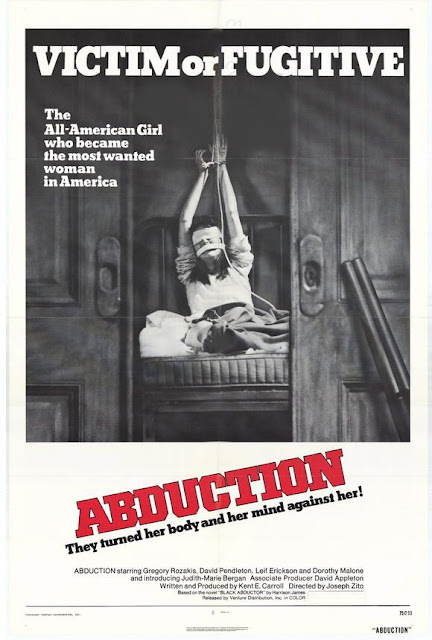Released a year after
Patty Heart’s kidnapping made headlines, harsh thriller Abduction bears more than a few suspicious similarities to Hearst’s
situation, even though the filmmakers use a disclaimer at the top of the
picture to call the parallels coincidental, seeing as how Abduction was based upon a novel published in 1973. In the
filmmakers’ meager defense, their storyline doesn’t include a bank robbery, and
it plays out differently than Hearst’s real-life circumstances. However, the
movie does concern an heiress named
Patricia being taken by a group of political radicals and then drawn into their
hive mind through psychosexual conditioning. Despite claims to the contrary, Abduction was made and marketed as a lurid
riff on Hearst. The kicker: Abduction
is a fairly solid movie, with an eerily restrained aesthetic, methodical
storytelling, and satisfactory performances. Some may find the picture slow, an
unavoidable problem for stories depicting extended periods of captivity, but
viewers able to look past the picture’s exploitive nature will find something
creepy and unsettling.
Rather than being the daughter
of a newspaper publisher, Patricia Prescott (Judith-Marie Bergan) is the
offspring of a rich developer. She’s violently abducted by radicals under the
command of Frank (Gregory Rosackis), an impassioned black radical determined to
undermine the ruling class. In a hideout, Frank has a colleague videotape him
raping Patricia. Then he sends the tape to her father (Leif Erickson),
demanding that Mr. Prescott demolish a luxury building that, Frank says,
represents capitalist oppression. As the film progresses, Mr. Prescott weighs
the consequences of giving in to demands while Frank plays mind games with
Patricia, eventually bringing her around to his way of thinking. Or so it
seems. Director Joseph Zito and his collaborators do a passable job of tracking
Patricia’s mental state, creating empathy for her predicament as well as
ambiguity about whether she’s truly “converted” or whether she’s patronizing
her captors.
Particularly because the pacing is meditative, with extended
camera takes and long periods that are bereft of scoring, a suitably oppressive
mood takes hold, all the way to the intense ending. As an example of what the
film does well, consider the recurring image of Mr. Prescott, sitting alone in
his home office, staring at hostage videos of his daughter’s sexual violations,
the harrowing frames seen in flickering reflections on his eyeglasses. Yikes.
Sex, however, also contributes to Abduction’s
biggest problem. Zito lingers so long on carnal scenes that Abduction has a leering quality, even
though Zito emphasizes the horror, rather than the titillation, of
such sequences. As one of Frank’s colleagues says to Patricia with chilling
amiability: “It’s not you I want to hurt—I hope you
remember that.”
Abduction:
FUNKY


1 comment:
Regarding the image chosen for the 1-sheet.
S&M was mainstreaming in '75 with the success of the THE STORY OF O and the h/core THE STORY OF JOANNA.
Post a Comment